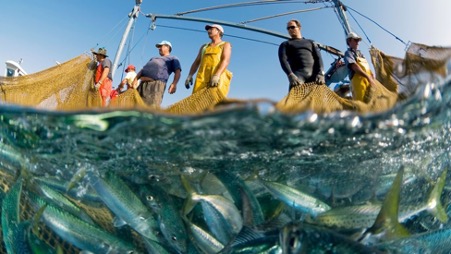A new report reveals that half of the United Kingdom’s ten largest fish populations are facing severe challenges, with some being overfished or reduced to critically low levels. The findings, published by the Washington DC-based NGO Oceana, point to the UK government’s practice of setting catch limits that exceed scientific recommendations as a primary driver of this crisis.
The UK’s fishing industry heavily relies on these ten key fish stocks. Among them, five are currently experiencing overfishing, including mackerel, which accounted for the largest volume of UK landings in 2021. Additionally, others, such as North Sea cod, have reached critically low population levels, putting popular fish species on the brink of collapse.
The report conducted a comprehensive assessment of 104 fish populations, encompassing most of the UK’s commercial fish stocks. Shockingly, it found that 34% of these populations are being overfished, while only 45% are being sustainably managed. Insufficient data prevented an assessment of the remaining fish stocks.
In addition to evaluating fishing pressure, the report examined population sizes, revealing that less than half (41%) of these populations are at a healthy size, and a quarter are in critical condition. Again, a lack of data hindered the assessment of some stocks.
Hugo Tagholm, the director and vice president of Oceana in the UK, accused the government of disregarding scientific advice and allowing the overexploitation of the seas. He called for the UK to demonstrate political leadership by adhering to catch limits aligned with scientific guidance and adopting an ambitious strategy to end overfishing.
Tagholm emphasized that the issue of overfishing is primarily linked to industrial fisheries, not small inshore fishers, who make up nearly 80% of Britain’s fishing fleet. He highlighted that only 3% of the fishing quota is allocated to small inshore fishermen in places like Newlyn.
Among the worst-managed populations are Celtic Sea cod, West of Scotland cod, and Irish Sea whiting, which are so depleted that the International Council for the Exploration of the Sea (ICES) has recommended a total ban on all catches.
The report underscores that sustainable catch limits are essential for maintaining healthy fish populations. For example, for the five best-performing stocks, catch limits for 2020-2023 closely followed ICES scientific advice. Conversely, for four of the five worst-performing stocks, catch limits were set higher than the scientific recommendations.
The report aims to provide an evidence-based snapshot of the status of UK fish stocks since the country’s departure from the EU and the Common Fisheries Policy. Since January 2021, the UK has been responsible for setting total allowable catch limits in its own waters. However, because most stocks are shared, the UK and EU have agreed to collaborate on annual recommendations through the Trade and Cooperation Agreement, involving a review of scientific advice on catch limits from ICES.
Oceana’s report highlights that ongoing political decisions to set catch limits above scientific advice are perpetuating the problem of overfishing, leading to a decline in previously healthy stocks and only a few improvements in critically low populations since 2020.

